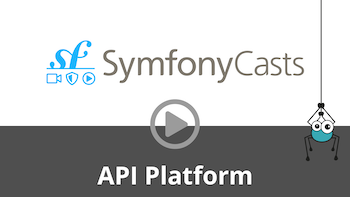SubresourcesTable of Contents
Table of Contents
A subresource is a collection or an item that belongs to another resource. API Platform makes it easy to create such operations.

Watch the Subresources screencast
The starting point of a subresource must be a relation on an existing resource.
For example, let’s create two entities (Question, Answer) and set up a subresource so that /question/42/answer gives us
the answer to the question 42:
<?php
// api/src/Entity/Answer.php
namespace App\Entity;
use ApiPlatform\Core\Annotation\ApiResource;
use Doctrine\ORM\Mapping as ORM;
#[ORM\Entity]
#[ApiResource]
class Answer
{
#[ORM\Id, ORM\Column, ORM\GeneratedValue]
private ?int $id = null;
#[ORM\Column(type: 'text')]
public string $content;
#[ORM\OneToOne]
public Question $question;
public function getId(): ?int
{
return $this->id;
}
// ...
}
// api/src/Entity/Question.php
namespace App\Entity;
use ApiPlatform\Core\Annotation\ApiResource;
use ApiPlatform\Core\Annotation\ApiSubresource;
use Doctrine\ORM\Mapping as ORM;
#[ORM\Entity]
#[ApiResource]
class Question
{
#[ORM\Id, ORM\Column, ORM\GeneratedValue]
private ?int $id = null;
#[ORM\Column(type: 'text')]
public string $content;
#[ORM\OneToOne]
#[ORM\JoinColumn(referencedColumnName: 'id', unique: true)]
#[ApiSubresource]
public Answer $answer;
public function getId(): ?int
{
return $this->id;
}
// ...
}# api/config/api_platform/resources.yaml
App\Entity\Answer: ~
App\Entity\Question:
properties:
answer:
subresource:
resourceClass: 'App\Entity\Answer'
collection: falseNote that all we had to do is to set up #[ApiSubresource] on the Question::answer relation. Because the answer is a to-one relation, we know that this subresource is an item. Therefore the response will look like this:
{
"@context": "/contexts/Answer",
"@id": "/answers/42",
"@type": "Answer",
"id": 42,
"content": "Life, the Universe, and Everything",
"question": "/questions/42"
}If you put the subresource on a relation that is to-many, you will retrieve a collection.
Last but not least, subresources can be nested, such that /questions/42/answer/comments will get the collection of comments for the answer to question 42.
Note: only for GET operations are supported at the moment
# Using Serialization Groups
You may want custom groups on subresources, you can set normalization_context or denormalization_context on that operation. To do so, add a subresourceOperations node. For example:
<?php
// api/src/Entity/Answer.php
namespace App\Entity;
use ApiPlatform\Core\Annotation\ApiResource;
#[ApiResource(
subresourceOperations: [
'api_questions_answer_get_subresource' => [
'method' => 'GET',
'normalization_context' => [
'groups' => ['foobar'],
],
],
],
)]
class Answer
{
// ...
}# api/config/api_platform/resources.yaml
App\Entity\Answer:
subresourceOperations:
api_questions_answer_get_subresource:
method: 'GET'
normalization_context: {groups: ['foobar']}<?xml version="1.0" encoding="UTF-8" ?>
<!-- api/config/api_platform/resources.xml -->
<resources xmlns="https://api-platform.com/schema/metadata"
xmlns:xsi="http://www.w3.org/2001/XMLSchema-instance"
xsi:schemaLocation="https://api-platform.com/schema/metadata
https://api-platform.com/schema/metadata/metadata-2.0.xsd">
<resource class="App\Entity\Answer">
<subresourceOperations>
<subresourceOperation name="api_questions_answer_get_subresource">
<attribute name="method">GET</attribute>
<attribute name="normalization_context">
<attribute name="groups">
<attribute>foobar</attribute>
</attribute>
</attribute>
</subresourceOperation>
</subresourceOperations>
</resource>
</resources>In the previous examples, the method attribute is mandatory, because the operation name doesn’t match a supported HTTP
method.
Note that the operation name, here api_questions_answer_get_subresource, is the important keyword.
It’ll be automatically set to $resources_$subresource(s)_get_subresource. To find the correct operation name you
may use bin/console debug:router.
# Using Custom Paths
You can control the path of subresources with the path option of the subresourceOperations parameter.
<?php
// api/src/Entity/Question.php
#[ApiResource(
subresourceOperations: [
'answer_get_subresource' => [
'method' => 'GET',
'path' => '/questions/{id}/all-answers',
],
],
)]
class Question
{
}# Access Control of Subresources
The subresourceOperations attribute also allows you to add an access control on each path with the attribute security.
<?php
// api/src/Entity/Answer.php
#[ApiResource(
subresourceOperations: [
'api_questions_answer_get_subresource' => [
'security' => "is_granted('ROLE_AUTHENTICATED')",
],
],
)]
class Answer
{
}# Limiting Depth
You can control depth of subresources with the parameter maxDepth. For example, if the Answer entity also has a subresource
such as comments and you don’t want the route api/questions/{id}/answers/{id}/comments to be generated. You can do this by adding the parameter maxDepth in the ApiSubresource annotation or YAML/XML file configuration.
<?php
// api/src/Entity/Question.php
use ApiPlatform\Core\Annotation\ApiProperty;
use ApiPlatform\Core\Annotation\ApiResource;
use ApiPlatform\Core\Annotation\ApiSubresource;
#[ApiResource]
class Question
{
#[ApiSubresource(
maxDepth: 1,
)]
public $answer;
// ...
}You can also help us improve the documentation of this page.
